新概念英语二册超详教案讲义笔记Lesson 57 Can I help you madam 您要买什么,夫人?
文档属性
| 名称 | 新概念英语二册超详教案讲义笔记Lesson 57 Can I help you madam 您要买什么,夫人? | 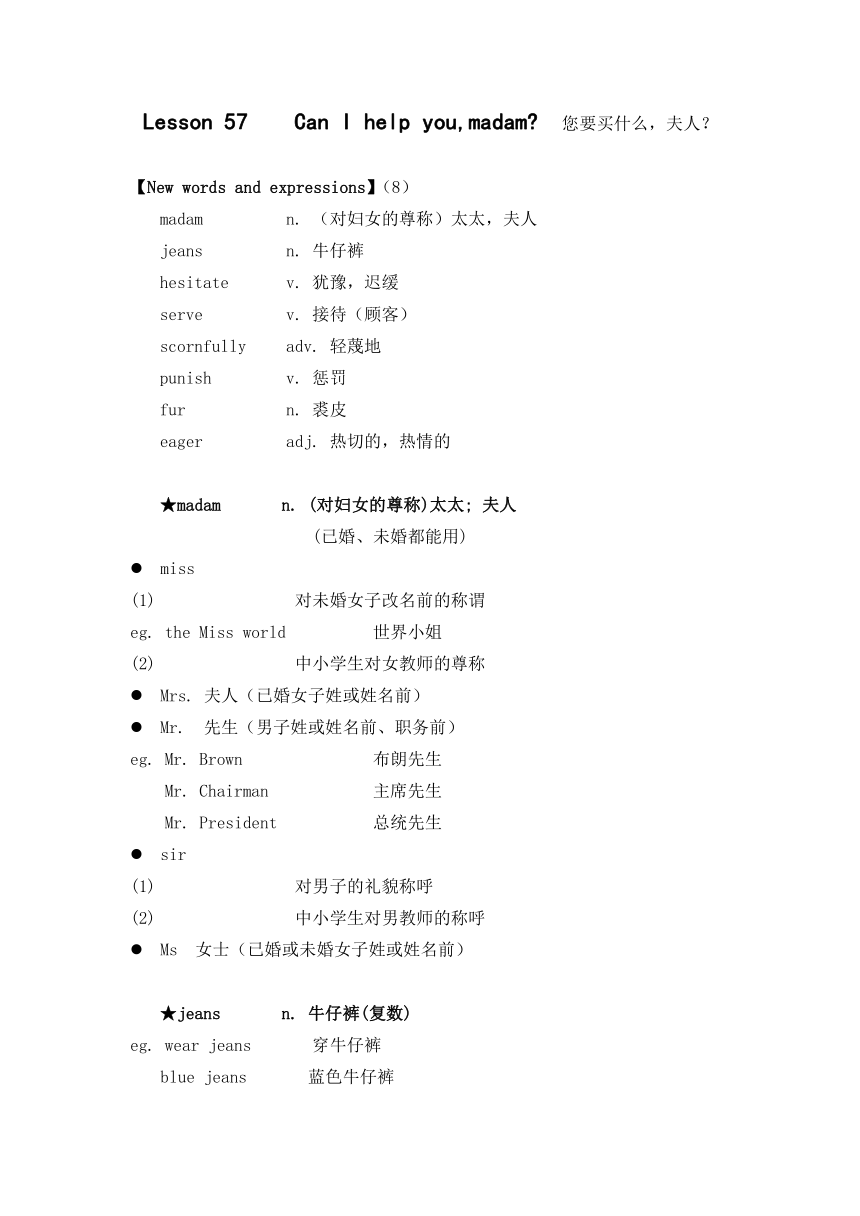 | |
| 格式 | docx | ||
| 文件大小 | 33.7KB | ||
| 资源类型 | 教案 | ||
| 版本资源 | 新概念英语 | ||
| 科目 | 英语 | ||
| 更新时间 | 2023-09-26 09:07:32 | ||
图片预览

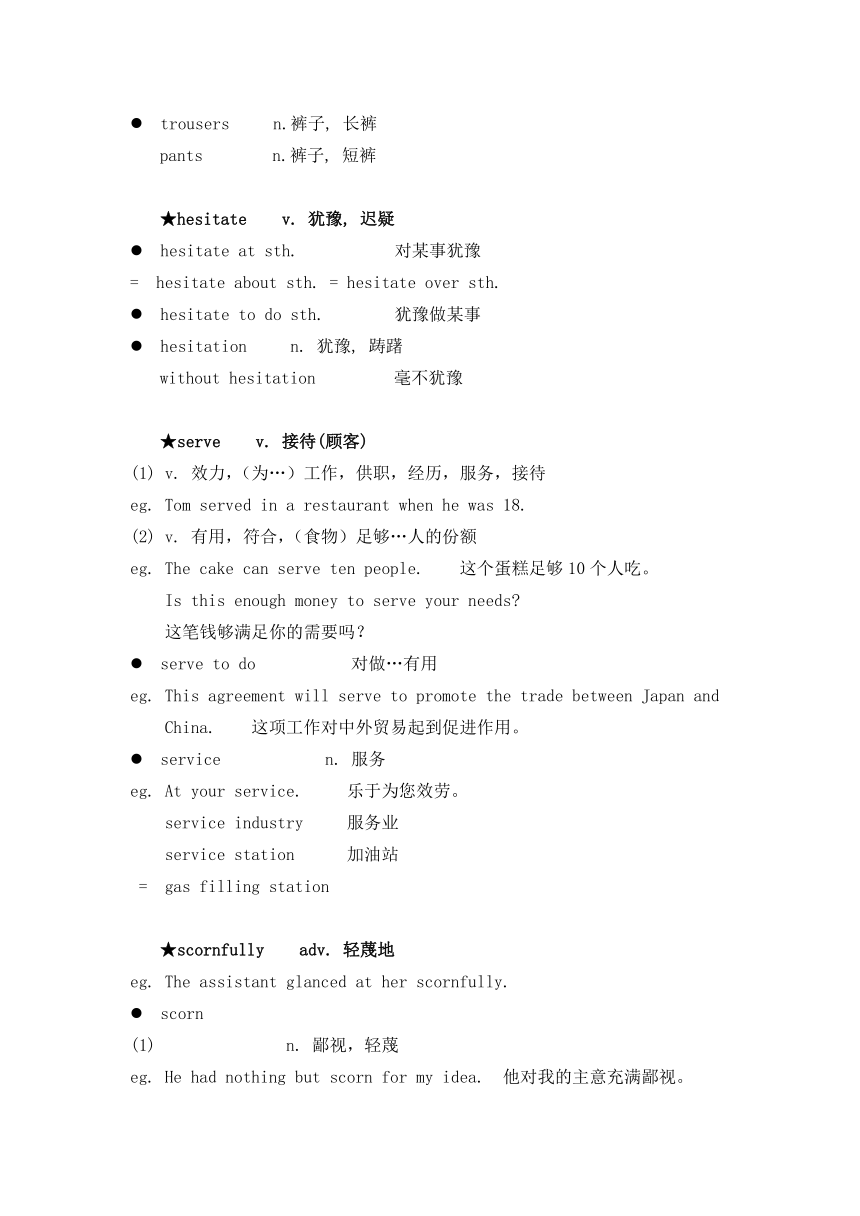
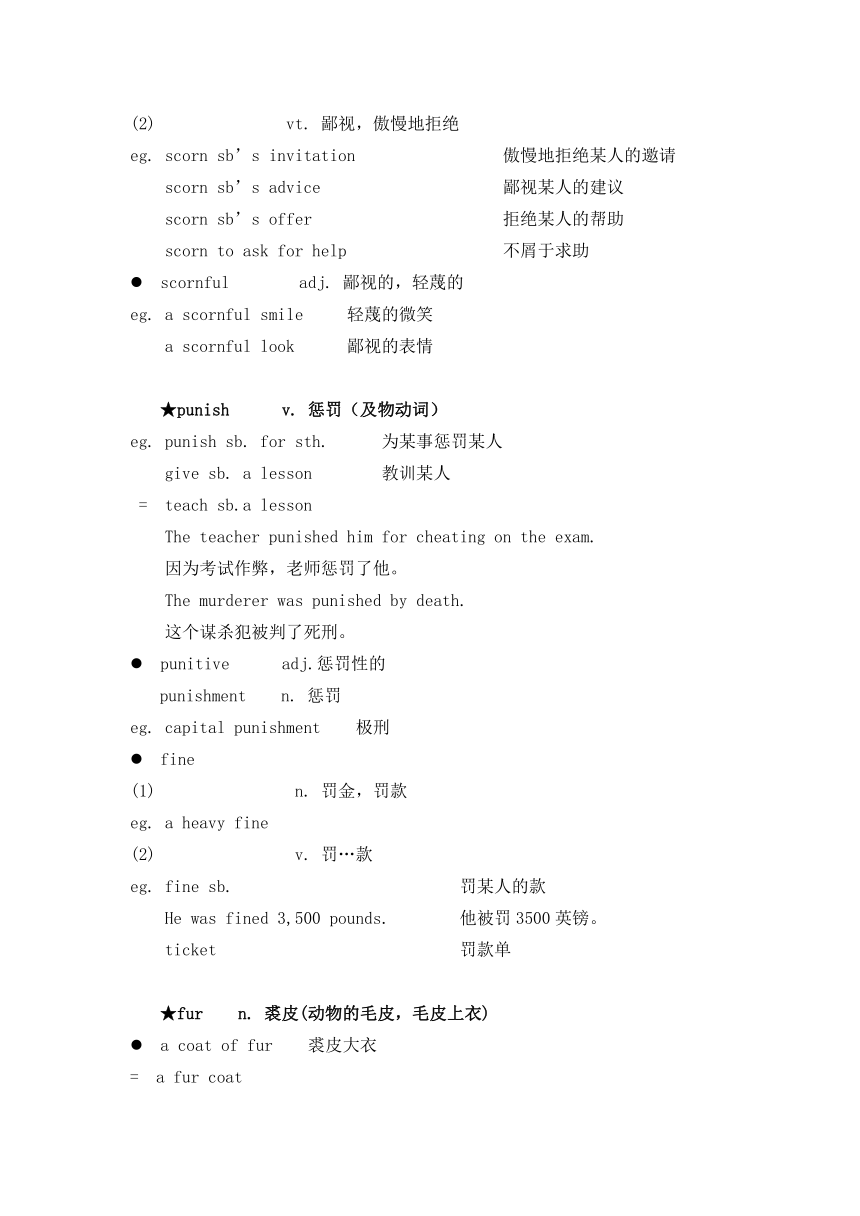
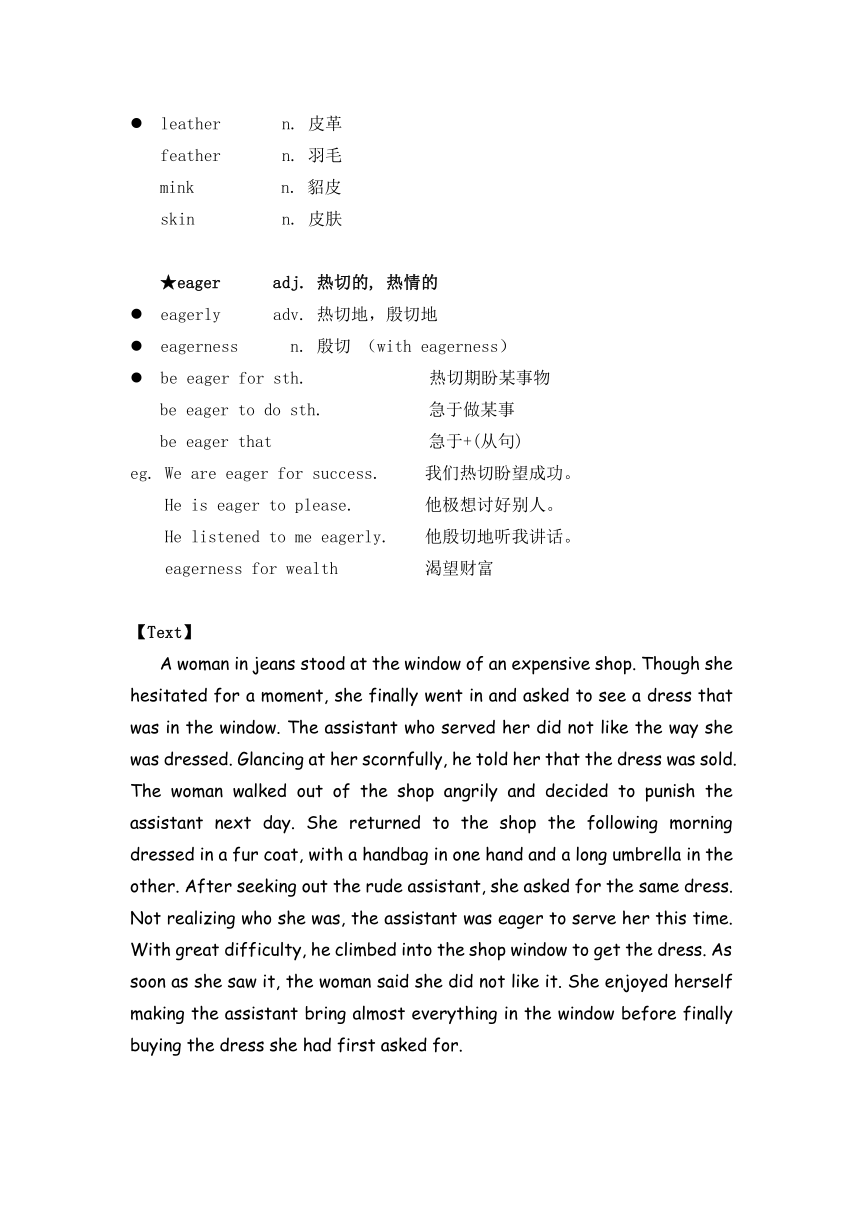
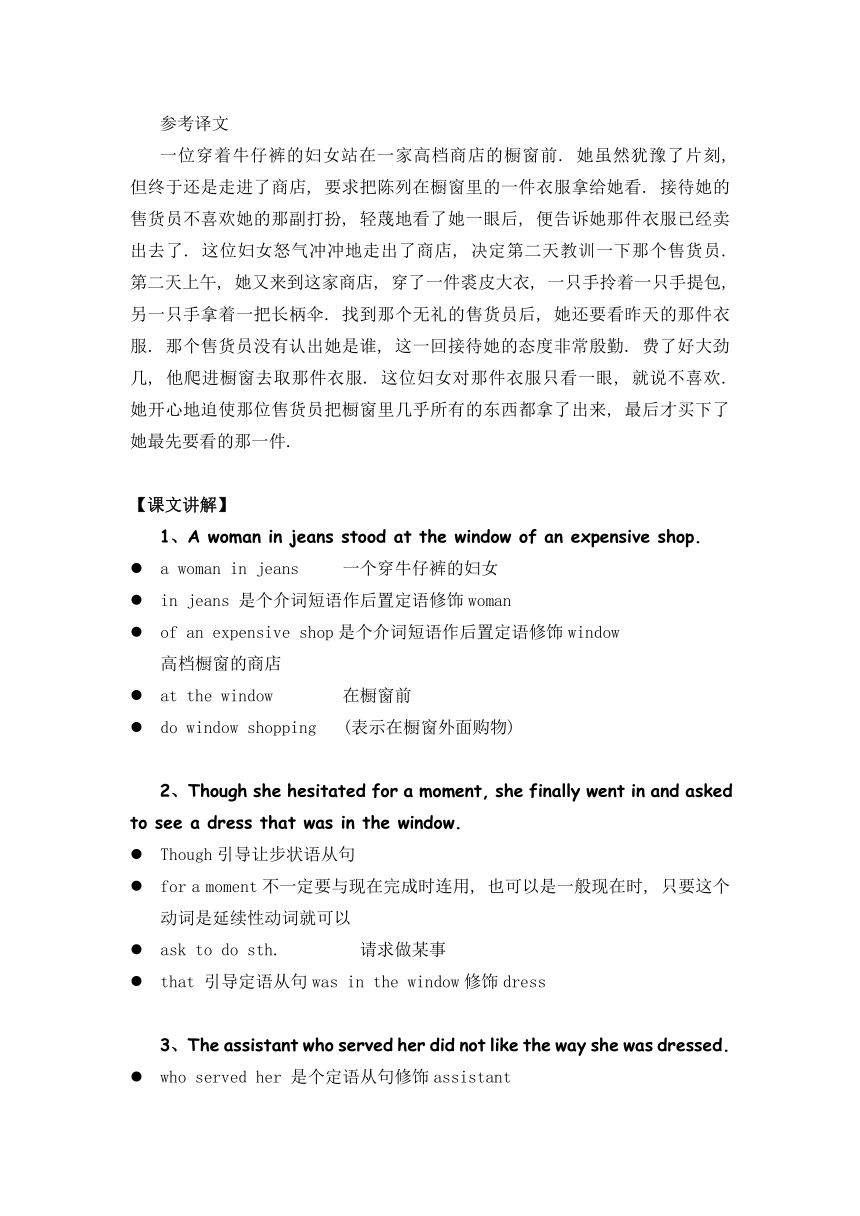
文档简介
Lesson 57 Can I help you,madam 您要买什么,夫人?
【New words and expressions】(8)
madam n. (对妇女的尊称)太太,夫人
jeans n. 牛仔裤
hesitate v. 犹豫,迟缓
serve v. 接待(顾客)
scornfully adv. 轻蔑地
punish v. 惩罚
fur n. 裘皮
eager adj. 热切的,热情的
★madam n. (对妇女的尊称)太太; 夫人
(已婚、未婚都能用)
miss
对未婚女子改名前的称谓
eg. the Miss world 世界小姐
中小学生对女教师的尊称
Mrs. 夫人(已婚女子姓或姓名前)
Mr. 先生(男子姓或姓名前、职务前)
eg. Mr. Brown 布朗先生
Mr. Chairman 主席先生
Mr. President 总统先生
sir
对男子的礼貌称呼
中小学生对男教师的称呼
Ms 女士(已婚或未婚女子姓或姓名前)
★jeans n. 牛仔裤(复数)
eg. wear jeans 穿牛仔裤
blue jeans 蓝色牛仔裤
trousers n.裤子, 长裤
pants n.裤子, 短裤
★hesitate v. 犹豫, 迟疑
hesitate at sth. 对某事犹豫
= hesitate about sth. = hesitate over sth.
hesitate to do sth. 犹豫做某事
hesitation n. 犹豫, 踌躇
without hesitation 毫不犹豫
★serve v. 接待(顾客)
(1) v. 效力,(为…)工作,供职,经历,服务,接待
eg. Tom served in a restaurant when he was 18.
(2) v. 有用,符合,(食物)足够…人的份额
eg. The cake can serve ten people. 这个蛋糕足够10个人吃。
Is this enough money to serve your needs
这笔钱够满足你的需要吗?
serve to do 对做…有用
eg. This agreement will serve to promote the trade between Japan and
China. 这项工作对中外贸易起到促进作用。
service n. 服务
eg. At your service. 乐于为您效劳。
service industry 服务业
service station 加油站
= gas filling station
★scornfully adv. 轻蔑地
eg. The assistant glanced at her scornfully.
scorn
n. 鄙视,轻蔑
eg. He had nothing but scorn for my idea. 他对我的主意充满鄙视。
vt. 鄙视,傲慢地拒绝
eg. scorn sb’s invitation 傲慢地拒绝某人的邀请
scorn sb’s advice 鄙视某人的建议
scorn sb’s offer 拒绝某人的帮助
scorn to ask for help 不屑于求助
scornful adj. 鄙视的,轻蔑的
eg. a scornful smile 轻蔑的微笑
a scornful look 鄙视的表情
★punish v. 惩罚(及物动词)
eg. punish sb. for sth. 为某事惩罚某人
give sb. a lesson 教训某人
= teach sb.a lesson
The teacher punished him for cheating on the exam.
因为考试作弊,老师惩罚了他。
The murderer was punished by death.
这个谋杀犯被判了死刑。
punitive adj.惩罚性的
punishment n. 惩罚
eg. capital punishment 极刑
fine
n. 罚金,罚款
eg. a heavy fine
v. 罚…款
eg. fine sb. 罚某人的款
He was fined 3,500 pounds. 他被罚3500英镑。
ticket 罚款单
★fur n. 裘皮(动物的毛皮,毛皮上衣)
a coat of fur 裘皮大衣
= a fur coat
leather n. 皮革
feather n. 羽毛
mink n. 貂皮
skin n. 皮肤
★eager adj. 热切的, 热情的
eagerly adv. 热切地,殷切地
eagerness n. 殷切 (with eagerness)
be eager for sth. 热切期盼某事物
be eager to do sth. 急于做某事
be eager that 急于+(从句)
eg. We are eager for success. 我们热切盼望成功。
He is eager to please. 他极想讨好别人。
He listened to me eagerly. 他殷切地听我讲话。
eagerness for wealth 渴望财富
【Text】
A woman in jeans stood at the window of an expensive shop. Though she hesitated for a moment, she finally went in and asked to see a dress that was in the window. The assistant who served her did not like the way she was dressed. Glancing at her scornfully, he told her that the dress was sold. The woman walked out of the shop angrily and decided to punish the assistant next day. She returned to the shop the following morning dressed in a fur coat, with a handbag in one hand and a long umbrella in the other. After seeking out the rude assistant, she asked for the same dress. Not realizing who she was, the assistant was eager to serve her this time. With great difficulty, he climbed into the shop window to get the dress. As soon as she saw it, the woman said she did not like it. She enjoyed herself making the assistant bring almost everything in the window before finally buying the dress she had first asked for.
参考译文
一位穿着牛仔裤的妇女站在一家高档商店的橱窗前. 她虽然犹豫了片刻, 但终于还是走进了商店, 要求把陈列在橱窗里的一件衣服拿给她看. 接待她的售货员不喜欢她的那副打扮, 轻蔑地看了她一眼后, 便告诉她那件衣服已经卖出去了. 这位妇女怒气冲冲地走出了商店, 决定第二天教训一下那个售货员. 第二天上午, 她又来到这家商店, 穿了一件裘皮大衣, 一只手拎着一只手提包, 另一只手拿着一把长柄伞. 找到那个无礼的售货员后, 她还要看昨天的那件衣服. 那个售货员没有认出她是谁, 这一回接待她的态度非常殷勤. 费了好大劲几, 他爬进橱窗去取那件衣服. 这位妇女对那件衣服只看一眼, 就说不喜欢. 她开心地迫使那位售货员把橱窗里几乎所有的东西都拿了出来, 最后才买下了她最先要看的那一件.
【课文讲解】
1、A woman in jeans stood at the window of an expensive shop.
a woman in jeans 一个穿牛仔裤的妇女
in jeans 是个介词短语作后置定语修饰woman
of an expensive shop是个介词短语作后置定语修饰window
高档橱窗的商店
at the window 在橱窗前
do window shopping (表示在橱窗外面购物)
2、Though she hesitated for a moment, she finally went in and asked to see a dress that was in the window.
Though引导让步状语从句
for a moment不一定要与现在完成时连用, 也可以是一般现在时, 只要这个动词是延续性动词就可以
ask to do sth. 请求做某事
that 引导定语从句was in the window修饰dress
3、The assistant who served her did not like the way she was dressed.
who served her 是个定语从句修饰assistant
she was dressed是个定语从句修饰 the way
the way she was dressed 她打扮的方式
the way she talks 她说话的方式
the way he solved the problem 她解决问题的方式
(the way 可以直接加定语从句, 不需要引导词)
dress
vt. 穿衣,给…穿衣(强调动作)
eg. She dressed her baby. 她给孩子穿衣服。
穿着(强调状态)
eg. He dressed well. 他穿着华丽。
= He was well dressed.
be dressed 穿着,打扮(强调状态)
be dressed in + 衣物
put on 穿,戴(强调动作)
take off 脱掉
wear 穿着(强调状态)
= be dressed in
4、Glancing at her scornfully, he told her that the dress was sold.
Glancing at her scornfully是个现在分词短语作伴随状语
轻蔑地瞥了她一眼
he told her that the dress was sold是个宾语从句
5、The woman walked out of the shop angrily and decided to punish the assistant next day.
walk out of 走出
decide to do sth. 决定做某事
6、She returned to the shop the following morning dressed in a fur coat, with a handbag in one hand and a long umbrella in the other.
the following morning 第二天早上
= the next morning
(the following day = the next day 第二天)
dressed in a fur coat 是过去分词短语作伴随状语
with短语也是伴随状语,表示某人随身携带着
in one hand … in the other 一只手里…另一只手里
on the one hand … on the other 一方面…另一方面
eg. On the one hand, you accepted his gift; on the other hand, you are rude to him. What are your actual attitude to him
一方面你接受他的礼物,另一方面,你又对他很粗鲁,你到底是什么态度啊?
7、After seeking out the rude assistant, she asked for the same dress.
after seeking out 中seeking是动名词作介词after的宾语
seek – sought – sought 寻找,找到,得到
eg. We sought long and hard but found no answer.
我们费力多时也没能找到答案。
seek out 找出, 找到
seek happiness 追求幸福
seek comfort 追求安逸
seek wealth 追求财富
8、Not realizing who she was, the assistant was eager to serve her this time.
not realizing = without realizing
分词短语的否定形式做原因状语,现在分词短语代替一个分句位于句首时,其否定形式是在它前面加上not,without或never等否定词。这些词有时可互换,有时则不可:
eg. Not knowing her address, we couldn’t get in touch with her.
不知道她的地址,我们无法和她取得联系。
The doctor, not wishing to make her nervous, did not fully explain the seriousness of her condition.
医生不想让她紧张,所以没有充分告诉她情况的严重性。
Not/Without/Never hesitating for a moment, he ran after the thief.
Not being able to open the door, I asked my neighbour for help.
the assistant 售货员,助手
a lab assistant 实验室助理
an assistant manager 助理
assistant professor 助理教授
像eager,glad,pleased,sorry等描述感觉的形容词作表语时后面往往跟不定式:
eg. They are all eager to come.
I’m pleased to work with you.
9、With great difficulty, he climbed into the shop window to get the dress.
With great difficulty
(with + 抽象名词结构在句子中做状语,与该名词所对应的副词形式相同。如果要修饰该词组,在名词前加形容词。)
eg. with little difficulty 难度不大
with no difficulty 没困难
with care = carefully 小心地
with ease = easily 容易地
with pleasure 高兴地
to get the dress 不定式作目的状语
10、She enjoyed herself making the assistant bring almost everything in the window before finally buying the dress she had first asked for.
she had first asked for 作定语从句修饰dress
她最先要看的衣服
enjoy oneself doing sth. 开心的做某事
eg. She enjoys herself making fun of others. 她以捉弄别人为乐。
make sb. do sth. 让某人做某事
eg. I can’t make him change his mind. 我不能让他改变主意。
The teacher made the boy write the exercise again.
老师让那个孩子重做练习。
let sb. do(allow, permit) 允许,让
eg. Let me try. 让我试一下。
Don’t let the children touch anything in this room please.
请不要让孩子碰房间里的任何东西。
【Key structures】
At, In, Off and With
at: at 27 West Street
at the bus stop
at the station
at a small village
at the door
在具体地址或某一小地点前用at
in: in the street
in a country
in Berlin
in the park
in the room
in 指有范围的地方(在…里面,在某个大地方)
off: come off 掉
take off 拿掉,脱掉
roll off 滚落
off 指离开
in与with
in 用来描述某人的穿戴
with 某人有某生理特征,某物伴随着某人或某人随身携带着
eg. in blue 穿着蓝色衣服
in a blue coat 穿着蓝色外套
in a black suit 穿着黑色西服
the man with long hair (with表示本身固有)
a man with a scar on his face
the woman with a handbag (with 还可表示随身携带)
【Special Difficulties】
Make and Let
make和let后面都跟不带to的不定式,但意义上和用法上有区别:
make+名词/代词+不带to的不定式,表示“迫使,致使”:
She enjoyed herself making the assistant bring almost everything in the window.
What made him change his mind
That beard makes you look much older than you really are.
在被动语态中含有上述意义的make后面必须带to:
He was made to work fourteen hours a day.
He was made to change his mind.
let用于祈使句,建议包括说话者在内的人采取某一行动:
Let’s not waste any more time.
其否定形式除“Let’s not…”外也可以用“Don’t let’s…”:
Don’t let’s waste any more time.
let+名词/代词+不带to的不定式,表示“允许”:
Don't let him persuade you. 不要让他把你说服了.
Don't let the children touch anything in this room please.
如果宾语是us,则不能缩写成let’s:
Please let us have more time, will you
let后面可以跟一个被动的、不带to的不定式:
He let it be known that the house was his.
但let一般不用于被动意义来表示“被允许”,这时可用allow。
We were not allowed to speak.
【New words and expressions】(8)
madam n. (对妇女的尊称)太太,夫人
jeans n. 牛仔裤
hesitate v. 犹豫,迟缓
serve v. 接待(顾客)
scornfully adv. 轻蔑地
punish v. 惩罚
fur n. 裘皮
eager adj. 热切的,热情的
★madam n. (对妇女的尊称)太太; 夫人
(已婚、未婚都能用)
miss
对未婚女子改名前的称谓
eg. the Miss world 世界小姐
中小学生对女教师的尊称
Mrs. 夫人(已婚女子姓或姓名前)
Mr. 先生(男子姓或姓名前、职务前)
eg. Mr. Brown 布朗先生
Mr. Chairman 主席先生
Mr. President 总统先生
sir
对男子的礼貌称呼
中小学生对男教师的称呼
Ms 女士(已婚或未婚女子姓或姓名前)
★jeans n. 牛仔裤(复数)
eg. wear jeans 穿牛仔裤
blue jeans 蓝色牛仔裤
trousers n.裤子, 长裤
pants n.裤子, 短裤
★hesitate v. 犹豫, 迟疑
hesitate at sth. 对某事犹豫
= hesitate about sth. = hesitate over sth.
hesitate to do sth. 犹豫做某事
hesitation n. 犹豫, 踌躇
without hesitation 毫不犹豫
★serve v. 接待(顾客)
(1) v. 效力,(为…)工作,供职,经历,服务,接待
eg. Tom served in a restaurant when he was 18.
(2) v. 有用,符合,(食物)足够…人的份额
eg. The cake can serve ten people. 这个蛋糕足够10个人吃。
Is this enough money to serve your needs
这笔钱够满足你的需要吗?
serve to do 对做…有用
eg. This agreement will serve to promote the trade between Japan and
China. 这项工作对中外贸易起到促进作用。
service n. 服务
eg. At your service. 乐于为您效劳。
service industry 服务业
service station 加油站
= gas filling station
★scornfully adv. 轻蔑地
eg. The assistant glanced at her scornfully.
scorn
n. 鄙视,轻蔑
eg. He had nothing but scorn for my idea. 他对我的主意充满鄙视。
vt. 鄙视,傲慢地拒绝
eg. scorn sb’s invitation 傲慢地拒绝某人的邀请
scorn sb’s advice 鄙视某人的建议
scorn sb’s offer 拒绝某人的帮助
scorn to ask for help 不屑于求助
scornful adj. 鄙视的,轻蔑的
eg. a scornful smile 轻蔑的微笑
a scornful look 鄙视的表情
★punish v. 惩罚(及物动词)
eg. punish sb. for sth. 为某事惩罚某人
give sb. a lesson 教训某人
= teach sb.a lesson
The teacher punished him for cheating on the exam.
因为考试作弊,老师惩罚了他。
The murderer was punished by death.
这个谋杀犯被判了死刑。
punitive adj.惩罚性的
punishment n. 惩罚
eg. capital punishment 极刑
fine
n. 罚金,罚款
eg. a heavy fine
v. 罚…款
eg. fine sb. 罚某人的款
He was fined 3,500 pounds. 他被罚3500英镑。
ticket 罚款单
★fur n. 裘皮(动物的毛皮,毛皮上衣)
a coat of fur 裘皮大衣
= a fur coat
leather n. 皮革
feather n. 羽毛
mink n. 貂皮
skin n. 皮肤
★eager adj. 热切的, 热情的
eagerly adv. 热切地,殷切地
eagerness n. 殷切 (with eagerness)
be eager for sth. 热切期盼某事物
be eager to do sth. 急于做某事
be eager that 急于+(从句)
eg. We are eager for success. 我们热切盼望成功。
He is eager to please. 他极想讨好别人。
He listened to me eagerly. 他殷切地听我讲话。
eagerness for wealth 渴望财富
【Text】
A woman in jeans stood at the window of an expensive shop. Though she hesitated for a moment, she finally went in and asked to see a dress that was in the window. The assistant who served her did not like the way she was dressed. Glancing at her scornfully, he told her that the dress was sold. The woman walked out of the shop angrily and decided to punish the assistant next day. She returned to the shop the following morning dressed in a fur coat, with a handbag in one hand and a long umbrella in the other. After seeking out the rude assistant, she asked for the same dress. Not realizing who she was, the assistant was eager to serve her this time. With great difficulty, he climbed into the shop window to get the dress. As soon as she saw it, the woman said she did not like it. She enjoyed herself making the assistant bring almost everything in the window before finally buying the dress she had first asked for.
参考译文
一位穿着牛仔裤的妇女站在一家高档商店的橱窗前. 她虽然犹豫了片刻, 但终于还是走进了商店, 要求把陈列在橱窗里的一件衣服拿给她看. 接待她的售货员不喜欢她的那副打扮, 轻蔑地看了她一眼后, 便告诉她那件衣服已经卖出去了. 这位妇女怒气冲冲地走出了商店, 决定第二天教训一下那个售货员. 第二天上午, 她又来到这家商店, 穿了一件裘皮大衣, 一只手拎着一只手提包, 另一只手拿着一把长柄伞. 找到那个无礼的售货员后, 她还要看昨天的那件衣服. 那个售货员没有认出她是谁, 这一回接待她的态度非常殷勤. 费了好大劲几, 他爬进橱窗去取那件衣服. 这位妇女对那件衣服只看一眼, 就说不喜欢. 她开心地迫使那位售货员把橱窗里几乎所有的东西都拿了出来, 最后才买下了她最先要看的那一件.
【课文讲解】
1、A woman in jeans stood at the window of an expensive shop.
a woman in jeans 一个穿牛仔裤的妇女
in jeans 是个介词短语作后置定语修饰woman
of an expensive shop是个介词短语作后置定语修饰window
高档橱窗的商店
at the window 在橱窗前
do window shopping (表示在橱窗外面购物)
2、Though she hesitated for a moment, she finally went in and asked to see a dress that was in the window.
Though引导让步状语从句
for a moment不一定要与现在完成时连用, 也可以是一般现在时, 只要这个动词是延续性动词就可以
ask to do sth. 请求做某事
that 引导定语从句was in the window修饰dress
3、The assistant who served her did not like the way she was dressed.
who served her 是个定语从句修饰assistant
she was dressed是个定语从句修饰 the way
the way she was dressed 她打扮的方式
the way she talks 她说话的方式
the way he solved the problem 她解决问题的方式
(the way 可以直接加定语从句, 不需要引导词)
dress
vt. 穿衣,给…穿衣(强调动作)
eg. She dressed her baby. 她给孩子穿衣服。
穿着(强调状态)
eg. He dressed well. 他穿着华丽。
= He was well dressed.
be dressed 穿着,打扮(强调状态)
be dressed in + 衣物
put on 穿,戴(强调动作)
take off 脱掉
wear 穿着(强调状态)
= be dressed in
4、Glancing at her scornfully, he told her that the dress was sold.
Glancing at her scornfully是个现在分词短语作伴随状语
轻蔑地瞥了她一眼
he told her that the dress was sold是个宾语从句
5、The woman walked out of the shop angrily and decided to punish the assistant next day.
walk out of 走出
decide to do sth. 决定做某事
6、She returned to the shop the following morning dressed in a fur coat, with a handbag in one hand and a long umbrella in the other.
the following morning 第二天早上
= the next morning
(the following day = the next day 第二天)
dressed in a fur coat 是过去分词短语作伴随状语
with短语也是伴随状语,表示某人随身携带着
in one hand … in the other 一只手里…另一只手里
on the one hand … on the other 一方面…另一方面
eg. On the one hand, you accepted his gift; on the other hand, you are rude to him. What are your actual attitude to him
一方面你接受他的礼物,另一方面,你又对他很粗鲁,你到底是什么态度啊?
7、After seeking out the rude assistant, she asked for the same dress.
after seeking out 中seeking是动名词作介词after的宾语
seek – sought – sought 寻找,找到,得到
eg. We sought long and hard but found no answer.
我们费力多时也没能找到答案。
seek out 找出, 找到
seek happiness 追求幸福
seek comfort 追求安逸
seek wealth 追求财富
8、Not realizing who she was, the assistant was eager to serve her this time.
not realizing = without realizing
分词短语的否定形式做原因状语,现在分词短语代替一个分句位于句首时,其否定形式是在它前面加上not,without或never等否定词。这些词有时可互换,有时则不可:
eg. Not knowing her address, we couldn’t get in touch with her.
不知道她的地址,我们无法和她取得联系。
The doctor, not wishing to make her nervous, did not fully explain the seriousness of her condition.
医生不想让她紧张,所以没有充分告诉她情况的严重性。
Not/Without/Never hesitating for a moment, he ran after the thief.
Not being able to open the door, I asked my neighbour for help.
the assistant 售货员,助手
a lab assistant 实验室助理
an assistant manager 助理
assistant professor 助理教授
像eager,glad,pleased,sorry等描述感觉的形容词作表语时后面往往跟不定式:
eg. They are all eager to come.
I’m pleased to work with you.
9、With great difficulty, he climbed into the shop window to get the dress.
With great difficulty
(with + 抽象名词结构在句子中做状语,与该名词所对应的副词形式相同。如果要修饰该词组,在名词前加形容词。)
eg. with little difficulty 难度不大
with no difficulty 没困难
with care = carefully 小心地
with ease = easily 容易地
with pleasure 高兴地
to get the dress 不定式作目的状语
10、She enjoyed herself making the assistant bring almost everything in the window before finally buying the dress she had first asked for.
she had first asked for 作定语从句修饰dress
她最先要看的衣服
enjoy oneself doing sth. 开心的做某事
eg. She enjoys herself making fun of others. 她以捉弄别人为乐。
make sb. do sth. 让某人做某事
eg. I can’t make him change his mind. 我不能让他改变主意。
The teacher made the boy write the exercise again.
老师让那个孩子重做练习。
let sb. do(allow, permit) 允许,让
eg. Let me try. 让我试一下。
Don’t let the children touch anything in this room please.
请不要让孩子碰房间里的任何东西。
【Key structures】
At, In, Off and With
at: at 27 West Street
at the bus stop
at the station
at a small village
at the door
在具体地址或某一小地点前用at
in: in the street
in a country
in Berlin
in the park
in the room
in 指有范围的地方(在…里面,在某个大地方)
off: come off 掉
take off 拿掉,脱掉
roll off 滚落
off 指离开
in与with
in 用来描述某人的穿戴
with 某人有某生理特征,某物伴随着某人或某人随身携带着
eg. in blue 穿着蓝色衣服
in a blue coat 穿着蓝色外套
in a black suit 穿着黑色西服
the man with long hair (with表示本身固有)
a man with a scar on his face
the woman with a handbag (with 还可表示随身携带)
【Special Difficulties】
Make and Let
make和let后面都跟不带to的不定式,但意义上和用法上有区别:
make+名词/代词+不带to的不定式,表示“迫使,致使”:
She enjoyed herself making the assistant bring almost everything in the window.
What made him change his mind
That beard makes you look much older than you really are.
在被动语态中含有上述意义的make后面必须带to:
He was made to work fourteen hours a day.
He was made to change his mind.
let用于祈使句,建议包括说话者在内的人采取某一行动:
Let’s not waste any more time.
其否定形式除“Let’s not…”外也可以用“Don’t let’s…”:
Don’t let’s waste any more time.
let+名词/代词+不带to的不定式,表示“允许”:
Don't let him persuade you. 不要让他把你说服了.
Don't let the children touch anything in this room please.
如果宾语是us,则不能缩写成let’s:
Please let us have more time, will you
let后面可以跟一个被动的、不带to的不定式:
He let it be known that the house was his.
但let一般不用于被动意义来表示“被允许”,这时可用allow。
We were not allowed to speak.
同课章节目录
